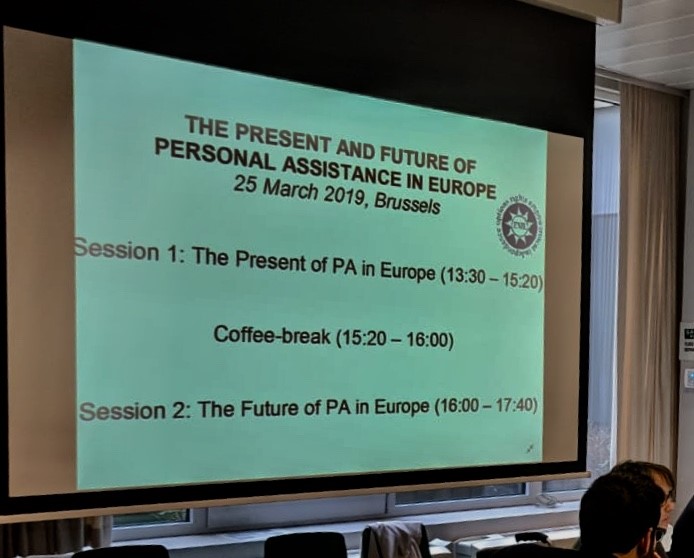Reflections on Personal Assistance across Europe
Written by Dr Miro Griffiths

On the 25th March 2019, the European Network on Independent Living hosted an international conference on the present and future of personal assistance in Europe. With activists, policymakers, scholars, and civil society organisations in attendance, it was an opportunity to discuss the significance of personal assistance as a right for disabled people across Europe. There was also further debate on recent European Union developments and the impact such developments would have on the provision of personal assistance now and in the future. A recording of the entire event can be found on the European Network on Independent Living YouTube channel.
Jamie Bolling, Director of the Independent Living Institute in Sweden, highlighted deep concerns with regard to the provision of personal assistance across Europe. Jamie suggested it was essential to design, develop, and deliver personal assistance schemes through a framework of achieving disabled people’s rights and ensuring disabled people have control and choice over every aspect of their life.
Dr Teodor Mladenov, Marie Curie Research Fellow, introduced contemporary research on personal assistance schemes across Europe, highlighting the opportunities and barriers within the policies that attempt to realise personal assistance. Teo’s research led to the development of the personal assistance checklist, which is a tool for assessing personal assistance schemes from the perspective of realising “Independent Living”. Whilst providing a useful comparative analysis of different schemes across European countries, it also suggests policy interventions to improve access to and delivery of personal assistance.
Dr Ciara Brennan, scholar in the Centre for Disability Studies at the University of Iceland, outlined contemporary research exploring the factors that perpetuate restrictions in the provision of personal assistance across Nordic countries. Through a critique of legislative frameworks, limited awareness and understanding of personal assistance by judicial staff, and the role of the media and other agenda setting platforms, Ciara suggested strategies to resist the reduction of the right to personal assistance within the Nordic countries.
Katarina Ivanković-Knežević, Director for Social Affairs and Inclusion at the European Commission, explored how the European Commission could act to address similar concerns raised during the presentations and discussions, as well as suggesting more dialogue was required between member states and civil society organisations to implement personal assistance schemes - ensuring they deliver intended outcomes and are sustainable.
Frank Sioen, Advocacy Officer at the European Network and Independent living, presented a range of recent developments within the European Union and how these developments could impact the future of personal assistance. Frank’s analysis highlighted the opportunities to advance personal assistance through the European Pillar of Social Rights, as well as the Multiannual Financial Framework post 2020. There was also explicit reference made to the upcoming elections within European Parliament, as a way to advance demands by activists and social movements to improve personal assistance.
Finally, Dr Miro Griffiths gave a reflection on the future of personal assistance in Europe, with a particular reference to the U.K.’s planned exit from the European Union. The script for Miro’s presentation is available here: Miro Speech at ENIL March 2019
Author
Dr Miro Griffiths
Leverhulme Early Career Research Fellow
